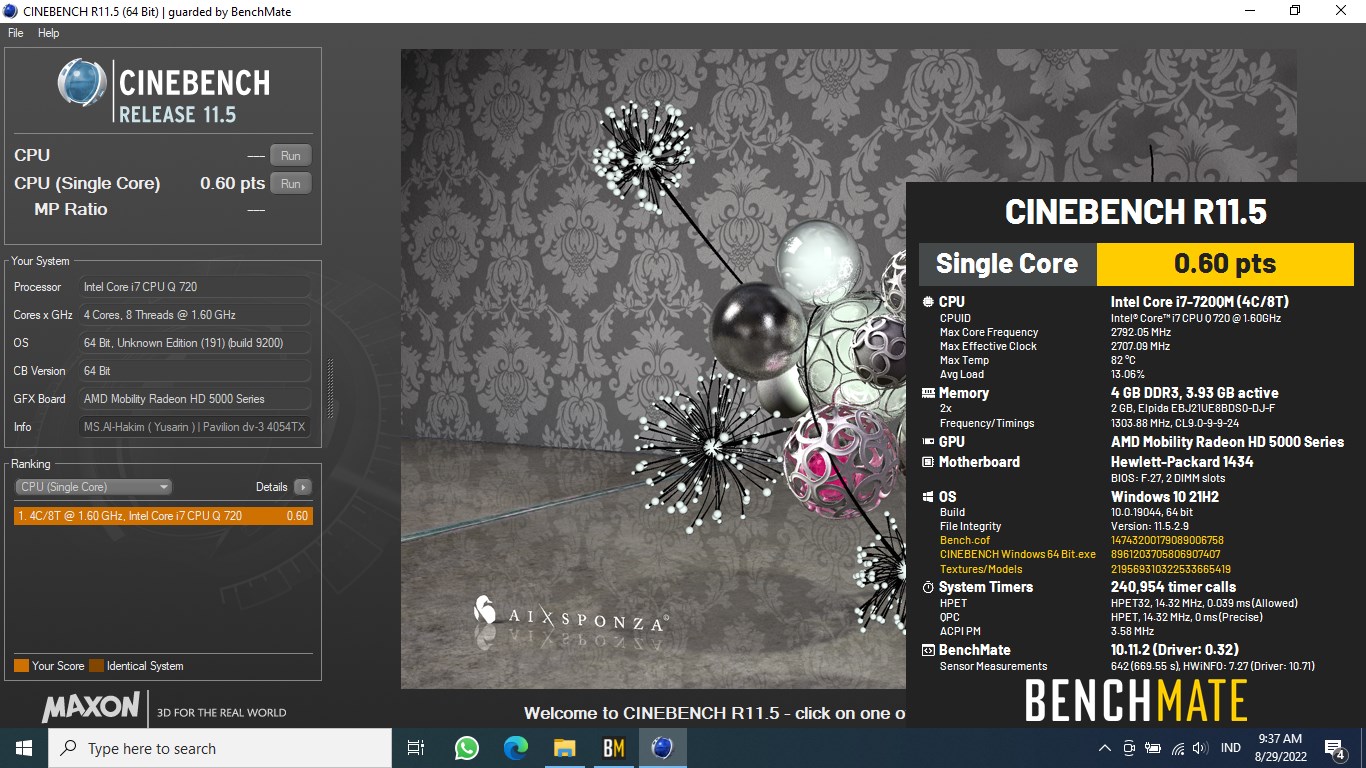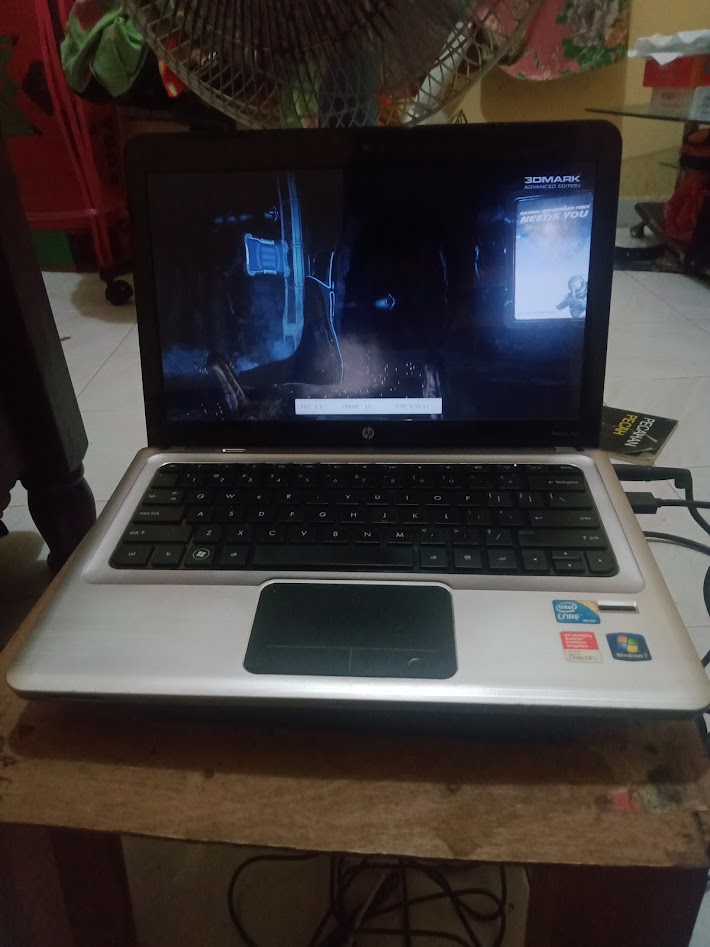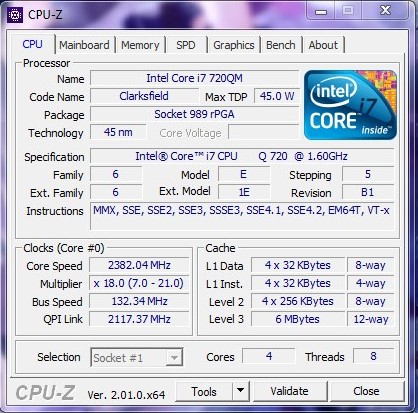Cinebench - R11.5 Single Core score 0.60 pts with a i7-720QM
Thursday, 01 January 1970 07:00 | Update at null
Media Gallery
Screenshot

Device, Setup, etc



URL
https://www.facebook.com/hakimnu.id/posts/3333504223548884Information Detail
Hardware: Intel Core i7 720QM
Specs:CPUID : Intel(R) Core(TM) i7 CPU Q 720 @ 1.60GHz
Architecture : x86
Codename : Clarksfield
L3 Cache : 6MB
Clock : 1.60GHz - 2.80GHz
Core/Thread : 4/8
TDP : 45W
Technology : 45nm
Socket : PGA988
IGPU : -
See more specification...
Software: Cinebench - R11.5 Single Core
Score: 0.60 pts
About: Cinebench - R11.5 Single CoreCinebench R11.5 – Single Core is part of the Cinebench benchmark suite, specifically designed to measure the single-core (single-threaded) performance of a processor. This benchmark is built on the CINEMA 4D rendering engine and uses a complex rendering scenario from the famous animation “No Keyframes” by AixSponza. Unlike multi-core testing, the single-core mode runs the rendering process on a single CPU core, making it highly effective for evaluating the efficiency of individual core architectures.
This test is crucial because many modern applications and games still rely on single-threaded performance, particularly for tasks that are difficult to parallelize, such as input processing, game logic, or operations dependent on single-instruction speed. Therefore, the results of Cinebench R11.5 single-core are highly relevant for users who want to know how fast and efficient their processor is in real-world scenarios that still rely on a single core.
The rendered scene includes more than 2,000 objects and 300,000 polygons, and uses various advanced graphics features such as sharp and blurred reflections, area lighting, realistic shadows, procedural shaders, and anti-aliasing. Despite running on a single thread, the workload remains heavy and can push the CPU core performance to its maximum limits. The final score is displayed in points (pts)—the higher the value, the better the processor's performance in single-threaded tasks.
Cinebench R11.5 single core is often used as a benchmark by reviewers, overclockers, and technical users who want to evaluate performance in light to moderate tasks. Additionally, this benchmark is useful for comparing processors across generations, particularly in terms of IPC (Instructions Per Clock), which significantly impacts single-core performance. Although newer versions of Cinebench are available, R11.5 remains a reliable and informative classic testing tool.
The Intel Core i7-720QM, launched in Q3 2009, was one of the first mobile quad-core processors to feature Intel's Nehalem microarchitecture, specifically the Clarksfield variant. Targeted at high-performance laptops, such as gaming machines and mobile workstations, the i7-720QM brought 4 physical cores and 8 threads to the mobile platform, thanks to Hyper-Threading Technology providing a significant boost in multi-threaded workloads like video editing, 3D rendering, and other professional-grade applications. The processor runs at a base clock speed of 1.6 GHz, but it can dynamically increase up to 2.8 GHz using Intel Turbo Boost, depending on thermal headroom and power availability.
Manufactured using a 45nm process, the i7-720QM has a TDP of 45W, which is quite high by today's mobile CPU standards. This thermal demand necessitated more robust cooling solutions in laptops that featured the chip. Unlike modern CPUs, the i7-720QM does not come with integrated graphics, which means systems based on this processor require a dedicated GPU often from AMD or NVIDIA for graphics processing and display output. As such, it was typically paired with mid-to-high-end discrete graphics cards in its time, making it a solid choice for gaming and multimedia laptops in the late 2000s and early 2010s.
While the Core i7-720QM was a powerhouse during its release, its performance and efficiency are significantly outpaced by modern CPUs built on smaller nodes and with higher IPC (Instructions Per Clock). Nevertheless, legacy laptops using the i7-720QM can still be viable for basic computing tasks like web browsing, document editing, or watching videos especially if paired with an SSD upgrade and increased RAM. Users running Windows 10 on such systems may experience some limitations, but with proper optimization and lightweight software, the CPU can still deliver a usable experience in non-demanding environments.
Hardware Detail:
Device: HP Pavilion dv3-4054TX
RAM: 4GB DDR3 Single Channel
OS: Windows 7, Windows 10
* Not Avaiable
